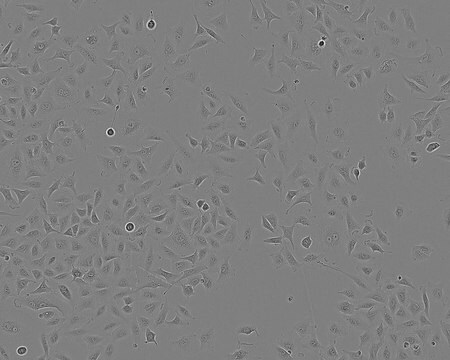RN46A
12061302, rat embryo d13 medullary raphe. Morphology: proliferating, fibroblast. Differentiating, neuronal.
Anmeldenzur Ansicht organisationsspezifischer und vertraglich vereinbarter Preise
Alle Fotos(1)
About This Item
UNSPSC-Code:
41106514
Biologische Quelle:
rat embryo (day 13 medullary raphe)
Wachstumsmodus:
Adherent
Karyotyp:
Not specified
Morphologie:
Fibroblast morphology while proliferating and neuronal on differentiation
Rezeptoren:
Not specified
Empfohlene Produkte
Produktbezeichnung
RN46A, 12061302
Biologische Quelle
rat embryo (day 13 medullary raphe)
Wachstumsmodus
Adherent
Karyotyp
Not specified
Morphologie
Fibroblast morphology while proliferating and neuronal on differentiation
Rezeptoren
Not specified
Suchen Sie nach ähnlichen Produkten? Aufrufen Leitfaden zum Produktvergleich
Ursprung der Zelllinie
Embryonic rat medullary raphe, temperature-sensitive mutant of SV40 large T-antigen, immortalised, serotonergic, neuronal
Beschreibung der Zelllinie
RN46A , an immortalized serotonergic neuronal cell line, was cloned by serial dilution following infection of dissociated embryonic day 13 rat medullary raphe cells with a retrovirus encoding the temperature-sensitive mutant of SV40 large T-antigen (T-ag), RN46A cells are capable of differentiating at 39 °C the non-permissive temperature. Under differentiation conditions, RN46A cells cease dividing, take on a neuronal morphology, and express enhanced levels of NSE and all three NF proteins. Differentiated RN46A cells express low-affinity nerve growth factor (NGF) receptor (p75NGFR) and are i mMunoreactive using an antibody that recognizes the carboxy-terminal 13 amino acids of all three trk proteins (pan-trk). Both i mMunoreactivities could be potentiated by treatment with brain-derived neurotrophic factor (BDNF), NGF, and adrenocorticotropic hormone, fragment 4-10 (ACTH4-10). Differentiated RN46A cells express low levels of tryptophan hydroxylase (TPH) i mMunoreactivity, which could be enhanced by treatment with ACTH4-10, BDNF, or NGF. Low levels of serotonin i mMunoreactivity are detected in differentiated RN46A cells, and this was potentiated by differentiating RN46A cells with BDNF for 8 d and 40 mM KCl for days 4-8. RN46A cells should prove useful to elucidate intracellular mechanisms that control neurofilament assembly and 5-HT expression in differentiating raphe neurons.
DNA-Profil
Not specified
Nährmedium
DMEM:F12 (1:1) (D8062) + L-Glutamine (G7513) + 10% FBS / FCS (F2442) + 0.25mg/ml Geneticin (G418). Alternatively CNS medium can be used (see Kawamoto & Barrett 1986). Differentiation can be induced as follows: cells growing at 33 °C are sub-cultured onto collagen/fibronectin matrix (100 μg/cm2 air-dried collagen I from rat tail followed by 1 μg/cm2 fibronectin). Sub-confluent cells (75%) are shifted to 39 °C. The culture medium is changed to DMEM:F12 (1:1) (D8062) + 1%(w/v) bovine serum albumin (BSA) + 1 μg/ml bovine transferrin + 5 μg/ml bovine insulin + 100 nM putrescine + 20 nM progesterone.
Subkultur-Routine
Split subconfluent cultures (70-80%) 1:2 to 1:5 using 0.25% trypsin/EDTA; 5% CO2; 33 °C. Suggested seeding density 2-4 x 10,000 cells/cm2. Doubling time 19hrs.
Sonstige Hinweise
Additional freight & handling charges may be applicable for Asia-Pacific shipments. Please check with your local Customer Service representative for more information.
Hier finden Sie alle aktuellen Versionen:
Analysenzertifikate (COA)
Lot/Batch Number
Leider sind derzeit keine COAs für dieses Produkt online verfügbar.
Wenn Sie Hilfe benötigen, wenden Sie sich bitte an Kundensupport
Besitzen Sie dieses Produkt bereits?
In der Dokumentenbibliothek finden Sie die Dokumentation zu den Produkten, die Sie kürzlich erworben haben.
Unser Team von Wissenschaftlern verfügt über Erfahrung in allen Forschungsbereichen einschließlich Life Science, Materialwissenschaften, chemischer Synthese, Chromatographie, Analytik und vielen mehr..
Setzen Sie sich mit dem technischen Dienst in Verbindung.





